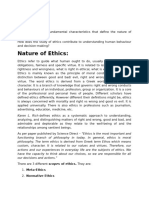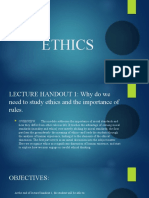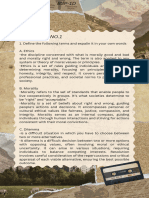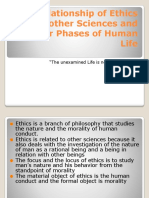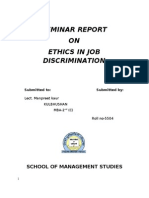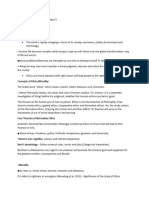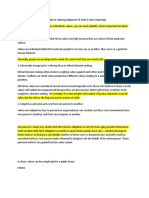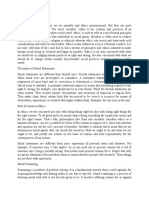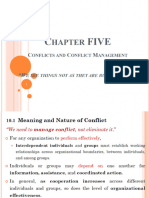0 ratings0% found this document useful (0 votes)
52 viewsBus Eth ch1
Bus Eth ch1
Uploaded by
AN NesThis document provides definitions and discusses the key concepts of business ethics. It defines ethics as a code of conduct that examines principles of right and wrong to prescribe human behavior. Business ethics applies these ethical principles to situations in business. The objectives of business ethics are to establish moral standards, assess behavior, prescribe dos and don'ts, and express opinions on conduct. Issues in business ethics can be examined at the individual, corporate, and systematic levels. The document outlines the nature, characteristics, objectives and related disciplines of ethics to provide context around business ethics.
Copyright:
© All Rights Reserved
Available Formats
Download as PPT, PDF, TXT or read online from Scribd
Bus Eth ch1
Bus Eth ch1
Uploaded by
AN Nes0 ratings0% found this document useful (0 votes)
52 views13 pagesThis document provides definitions and discusses the key concepts of business ethics. It defines ethics as a code of conduct that examines principles of right and wrong to prescribe human behavior. Business ethics applies these ethical principles to situations in business. The objectives of business ethics are to establish moral standards, assess behavior, prescribe dos and don'ts, and express opinions on conduct. Issues in business ethics can be examined at the individual, corporate, and systematic levels. The document outlines the nature, characteristics, objectives and related disciplines of ethics to provide context around business ethics.
Original Title
Bus Eth ch1 ppt
Copyright
© © All Rights Reserved
Available Formats
PPT, PDF, TXT or read online from Scribd
Share this document
Did you find this document useful?
Is this content inappropriate?
This document provides definitions and discusses the key concepts of business ethics. It defines ethics as a code of conduct that examines principles of right and wrong to prescribe human behavior. Business ethics applies these ethical principles to situations in business. The objectives of business ethics are to establish moral standards, assess behavior, prescribe dos and don'ts, and express opinions on conduct. Issues in business ethics can be examined at the individual, corporate, and systematic levels. The document outlines the nature, characteristics, objectives and related disciplines of ethics to provide context around business ethics.
Copyright:
© All Rights Reserved
Available Formats
Download as PPT, PDF, TXT or read online from Scribd
Download as ppt, pdf, or txt
0 ratings0% found this document useful (0 votes)
52 views13 pagesBus Eth ch1
Bus Eth ch1
Uploaded by
AN NesThis document provides definitions and discusses the key concepts of business ethics. It defines ethics as a code of conduct that examines principles of right and wrong to prescribe human behavior. Business ethics applies these ethical principles to situations in business. The objectives of business ethics are to establish moral standards, assess behavior, prescribe dos and don'ts, and express opinions on conduct. Issues in business ethics can be examined at the individual, corporate, and systematic levels. The document outlines the nature, characteristics, objectives and related disciplines of ethics to provide context around business ethics.
Copyright:
© All Rights Reserved
Available Formats
Download as PPT, PDF, TXT or read online from Scribd
Download as ppt, pdf, or txt
You are on page 1of 13
Chapter1
Introduction to Business Ethics
1.1. The general Concept Ethics
1.1.1 Definitions of Ethics
Source of the word "ethics" is derived from the Greek word "ethos" and Latin
word “ethicus” = which means custom or character referring to accepted
behaviors.
Ethics is the branch of philosophy that deals with the principles of morality and
standards of right and wrong that prescribe the human character and conduct in
terms of obligations, rights, rules, benefit to the society.
Ethics is a branch of social science and deals with moral principles and social
values.
Ethics helps us to classify what good and bad, right and wrong, fair and unfair,
moral and immoral and proper and improper human action.
In short, ethics means a code of conduct. It is like the 10 commandments of holy
Bible.
It tells a person how to behave with another person.
The whole purpose in having ethics is to the overall benefit of individuals and
groups. These two are the cornerstones of any society.
Definitions of Ethics…...Cont’d
Ethics can also be defined as a principle of conduct governing an
individual or a group. From this definition we can notice few power words
as principle, conduct, governance & individuals and groups.
Principles are the guidelines, criteria, standards that enable us to judge
the conduct of humans. In order to categorize different conducts as
acceptable or not there must be a certain principles of conduct in place
which will enable us compare the conduct.
Conduct is the way how humans behave. Psychological studies have
revealed that humans behave as an individual and at group levels. Conduct
refers the actions define who a person is and entail consequences. Eg. the
act of a student missing class consecutively will end up with a result of NG
on the course. NG in this context is the result of his/her conduct
Governance refers to the process of controlling and shaping how a certain
action shall be carried about. The governor is the one with the
responsibility to control the behavior. When ethics is defined as a subject
of governance it is to mean ensuring whether a behavior or action of
humans is in line with certain expected standards or principles.
Hence ethics by setting certain standards and expecting individuals and
groups to stick to them tries to govern how people conduct themselves in
their day to day endeavors.
1.1.2. Nature and Characteristics of Ethics
The following are the four major characteristics of ethics:
1. Ethics is applied on human beings
The subject matter is concerned about the acts and behaviors of
humans individually and as groups in a society.
2. Ethics is a science
It is concerned with the behaviors of individuals hence making it a
social science.
3. Ethics governs voluntary human conduct
People who are forced to do things or engage in a certain act without
their knowledge cannot be judged ethically.
Knowledge and foresight are the cornerstones of ethical judgment.
4. Ethics is a normative science
it sets standards and gives judgment about the rightness or
wrongness of a certain action.
Ethically evaluates an action as either right or wrong.
There is no middle way or the golden mean in the evaluation of
behavior of a person.
Ethics and Related Disciplines
The study of human behavior and conduct is carried out directly or
indirectly in psychology, sociology, anthropology, law, religion and cultural
studies. Here in after we shall briefly state how ethics is different from these
related studies.
Psychology and related disciplines study the human behavior to
understand how an individual human mind works. These are fields try to
understand the behaviors of humans. But ethics tries to establish the way
how people should behave.
Law is a mandatory prescription of behaviors. People are bound to act and
behave as stated by the law else sanction in the form of punishment will
follow. Although ethics suggest behaviors, there is no effective enforcement
mechanism to follow how people are behaving. Unlike law ethical standards
are shaped in universal terms for application in every jurisdiction.
Religion the primary goal of religious dictums is the life after death.
Behaviors are established and right and wrong is identified mostly with
emphasis to eternal life. In ethics behaviors are stated to make the world a
better place.
However, the common agenda in all is the study of human conduct as well
as the effort to shape behavior to a certain desired degree.
1.1.3. Objectives of Ethics
The basic objectives of ethical study.
Defines the greatest good for humans and establish a standard-
The “good life’’ was the question of great philosophers to provide answer for
The greatest good towards which all humans gear their energy with the hope of
creating a world just for all
Establishes norms of behavior
standards of ethics tend to end up being norms of conduct.
It is the objective of ethical theories to shape how people behave and set this
standards as the normal of day to day life.
Assessing human behavior as moral and immoral-
Ethics establishes the fine line that helps us identify certain acts as proper and
moral or unacceptable and immoral.
Prescribes of moral behaviors in do’s and don’ts-
the normative nature of ethics is manifested as it claims to order people engage in
certain acts and call people to refrain from certain types of behaviors.
The do’s are those behaviors with the set norms and standards so moral and
encourage; while the don’ts go contrary and one to avoid or not engage with.
Expressing opinion on human conduct-
ethics is a device for holding opinion on actions of people based on logic and
scientific analysis rather than a mere personal bias or preference.
Objectives…..cont’d
Generally the overall aim of ethics is the development of a moral
standard which are reasonable & justifiable which are to be applied in
day to day life decisions of humans.
Daniel Callahan in his article identified and discussed the following
five core aims of business ethics:
1. Stimulate your moral imagination
Helps to think right and wrong action in a more consistent way
2. Recognize ethical issues
to identify the core ethical issues in the business environment
3. Elicit your sense of moral obligation
motivate oneself in considering the moral obligation
4. Develop your analytical skills
to grow in the analysis process by working on both hypothetical and
real business cases with moral question
5. Tolerate and reduce disagreements and ambiguities
by appreciating the various ethical theories in place to be open for a
thorough discourse on morality
Moral Standards….cont’d
Moral standards are preferred to any other value including self
interest.
Moral standards are the best values to prioritize over any standard.
At times the ethical dilemma gives room for individuals to put different
justifications to deviate from morality.
The rule in ethics is to put morality as the exclusive standard when in
competition with any other standard.
Moral standards are based on impartial considerations(from the
moral point of view).
Partiality is defined as preference towards a certain person or idea or value
over another (a bias which puts favor towards one person to the
disadvantage of another).
Moral standards are based on reason hence the moral point of view is free
from any consideration except reason.
Moral standards are associated with special emotions and special
vocabulary.
The discussion of right and wrong behavior obviously ends up making
judgments.
Judgments on human behavior are followed up by emotional remarks such
as love, hate, happy, sad, disgusted, hungry reaction are all part of morality
1.3. Business Ethics
Every profession has ethical aspect. It is common to hear terms as medical ethics,
legal ethics and the like.
The profession of business with its primary motive of supplying goods and
services for the profit is an area a repeated claim of morality is raised.
Definitions of Business Ethics:
According to Andrew Crane, Business ethics is the study of business situations,
activities, and decisions where issues of right and wrong are addressed.
As defined by T.M. Garrett, Business ethics is a study of the moral rightness or
wrongness of the acts involved in the production, distribution and exchange of
economic goods and services.
According to Thomas J. Adams, Business ethics deals with the values of what is
right and wrong, good and bad and moral and immoral in business relationship.
The term business relationship is used here in a broader sense. It includes
relationship with its employees, consumers, competitors, Governments, and finally
the society at large.
Business ethics is defined as a specialized study of moral rights and wrongs as
they apply in business institutions, and behavior. It studies how moral standards
apply to the social system and organizations through which society produce and
distribute goods and services and to the behavior of people who work with in
organizations.
An application of ethical rule for business behaviors or conducts of actors in the
business sector is what business ethics is all about.
Business Ethics….Cont’d
The kinds of issues discussed in business ethics can be categorized in three
classes as individual, corporate and systematic.
An individual level business ethics is the evaluation of a person's conduct
in business either as an owner or as an employee of a business entity. Eg. If a
secretary reads confidential emails she was not suppose to access, her act is
to be morally wrong only after evaluating her individual deed.
Corporate level business ethics: Business is carried out by companies and
partnerships. This entities are for legal purposes treated as persons. For
example St.Mary’s university is a legal person which has rights and duties.
When ethical responsibilities considered at this level, it is a corporate level
ethical study.
System level ethics: Corporations and individuals do not behave in a
vacuum. When an ethical evaluation is made on the economic, political,
legal, and other social system within which businesses operate the study is
said to be made at a system level ethical study.
•There is a system or structure that is built to facilitate transactions.
•This is the wider aspect of ethical study and has a potential in shaping how
individual business persons and corporations are to behave.
Business Ethics….Cont’d
Business ethics as an applied or normative ethical study is said to
concentrate on three major areas of business activities (3C’s): compliance ,
contribution and consequence or the.
Compliance is regarding the business entities fulfillment of its obligations
stated under official laws of the country it operate. Compliance can also
mean respecting principles of morality set to govern the conduct of
businesses.
At individual level, compliance to the company policies to which an
employee pledges to respect up on employment.
Contribution refers to what the business has done or offered towards a
society.
It starts from the values the corporation hold to the quality of service and
goods it puts to the markets.
Employment opportunities it created is a contribution
Consequence has two basic contents. The consequence of the business to
the environment as well as the businesses social responsibility.
The two are interrelated and ethical studies evaluate them in conjunction.
1.3.2. Nature Characteristics of Business Ethics
The most common natures of business ethics are summarized as follows.
1. Code of Conduct: is a form of codes of conduct as it lets us know what to do and
what not to do. Businesses must follow this code of conduct.
Although the code may vary, there exists an explicit conduct code directing the
way people should behave in accomplishing their activity.
2. Based on Moral and Social Values: Business ethics is a subject that is based on
moral and social values, and offers some moral and social principles (rules) for
conducting a business.
The rules incorporated in the code of conducts emanate from the values embedded
in a society
3. Protection to Social Groups: Business ethics protect various social groups
including consumers, employees, small businesspersons, government,
shareholders, creditors, etc.
Social groups must be protected from the influence of certain actors who left
ungoverned
4. Offers a Basic Framework: is the basic framework for doing business properly.
It constructs the social, cultural, legal, economic, and other limits in which a
business must operate.
The assumption is an ethical system will result in an ethical corporation and
individual actor.
Nature and Characteristics….Cont’d
5. Voluntary: Business ethics is meant to be voluntary. It should be self-practiced
and must not be enforced by law.
In fact one of the difference between law and ethics is the fact that law is
mandatorily enforced
In business ethics we expect businesses to employ ethical conduct because they
found it right to do so not in fear of sanction or punishment.
6. Requires Education & Guidance: Businessmen should get proper education and
guidance about business ethics.
Trade Associations and Chambers of Commerce should be active enough in this
matter.
Educated business persons are better to employ ethics in their act as they
understand the inner workings of the ideas
7. Relative Term: Business ethics is a relative term. It changes from one business to
another and from one country to another.
8. New Concept: Business ethics is a relatively newer concept.
Developed countries have more exposure to business ethics, while poor and
developing countries are relatively backward.
This typically works for most things yet this in no way makes the challenges of
business and ethics lesser in developed or developing countries
Trying to incorporate real cases of Ethiopia or customizing cases from elsewhere
to the existing reality of Ethiopia will make the study of business ethics more
relevant to our need.
1.3.3. Need for Business Ethics
It is necessary to observe business ethics for the following reasons:
1. Survival of the Business Unit: Unethical practices of businessmen will lead
to the closure of business unit.
The closure of a business unit does not only create problems to business but
also to employees and the society in general.
The behavior of a businessman is affected by some of the factors such as
leadership qualities, integrity, knowledge, skills, influence and exercising
power.
2. Growth of Business Unit: Whenever a businessman observes ethics strictly,
definitely the particular business unit will get developed.
3. Earning Goodwill: If business ethics are properly followed by a business,
automatically it will earn a good name among the public.
4. Improving the Confidence: Business ethics are necessary to improve the
confidence of the customers, employees and the like.
If confidence is maintained, customers and employees will popularize the
name of the particular business unit.
5. Maintaining Inter-relationship: The inter-relationship of business is
maintained by adopting business ethics.
6. Solving Social Problems: If a business observes ethics in its decisions, the
public will not have any difficulty in getting their wants fulfilled. There is a
fair treatment of employees. This will avoid social problems like strike,
lockout etc.
You might also like
- ENV21 03 10 01 Lesson PlanDocument5 pagesENV21 03 10 01 Lesson PlanGenesis NgNo ratings yet
- Business Ethics Ch1 222Document13 pagesBusiness Ethics Ch1 222Maki Ye EmaNo ratings yet
- BE Chapter 1Document18 pagesBE Chapter 1damenegasa21No ratings yet
- Professional EthicsDocument67 pagesProfessional EthicstesfayeNo ratings yet
- Assignment 8420Document57 pagesAssignment 8420Hajra iftiNo ratings yet
- Unit 1 Ethics&CSRDocument9 pagesUnit 1 Ethics&CSRkaifsayyed010No ratings yet
- Introduction To Ethics: CE 421 - Civil Engineering Laws, Ethics and ContractsDocument18 pagesIntroduction To Ethics: CE 421 - Civil Engineering Laws, Ethics and ContractsVICTORIA OMEGA JARAMILLA100% (1)
- Ethics Lecture 1 & 2Document19 pagesEthics Lecture 1 & 2RONEL Aligam100% (2)
- Activity: "What Does Ethics Mean To You?" Agree Partially Agree Totally Agree Disagree Partially Disagree Totally DisagreeDocument72 pagesActivity: "What Does Ethics Mean To You?" Agree Partially Agree Totally Agree Disagree Partially Disagree Totally DisagreeGiddel NaragNo ratings yet
- Ethics NotesDocument31 pagesEthics NotesEngr Noman DilNo ratings yet
- Business EthicsDocument102 pagesBusiness Ethicsమధు సూదన రావు100% (6)
- BECSR Cha 1Document8 pagesBECSR Cha 1kirubelyitayalNo ratings yet
- Unit 1Document20 pagesUnit 1divyasinghraikwar000No ratings yet
- Ethics Notes 111Document40 pagesEthics Notes 111kitderoger_391648570No ratings yet
- Business Ethics Notes Bba First YearDocument14 pagesBusiness Ethics Notes Bba First Yearpratibhamishra5966100% (2)
- Unit1 BeDocument43 pagesUnit1 BeamiteshnegiNo ratings yet
- ETHICS Seatwork #1Document3 pagesETHICS Seatwork #1rogelynlumasagNo ratings yet
- Introduction To Culture and EthicsDocument8 pagesIntroduction To Culture and EthicsKaranja GitauNo ratings yet
- Chapter 1 Ethics and MoralityDocument42 pagesChapter 1 Ethics and MoralityCagang Maria AltheaNo ratings yet
- Business EthicsDocument15 pagesBusiness EthicsKawsar Ahmed BadhonNo ratings yet
- 28Document4 pages28DiyaNo ratings yet
- Unit 1Document23 pagesUnit 1Bhavesh PasrichaNo ratings yet
- Business Ethics & Corporate Governance: SnnairDocument24 pagesBusiness Ethics & Corporate Governance: SnnairAbhishekMohanNo ratings yet
- Mod 1Document42 pagesMod 1Adrian RiveraNo ratings yet
- Conceptual of Ethics PPT Chap 1Document32 pagesConceptual of Ethics PPT Chap 1isma farizNo ratings yet
- BE m1Document153 pagesBE m1ahalyagchandranNo ratings yet
- Chapte 1 Ethics AssessmentDocument4 pagesChapte 1 Ethics AssessmentSweetzel SenielNo ratings yet
- Notes For Ethics and GovernmentDocument3 pagesNotes For Ethics and GovernmentMruga JoshiNo ratings yet
- Document From Daadir Hassan MohamedDocument32 pagesDocument From Daadir Hassan MohamedAbdulahi farah AbdiNo ratings yet
- The Relationship of Ethics With Other Sciences and Other Phases of Human LifeDocument23 pagesThe Relationship of Ethics With Other Sciences and Other Phases of Human LifeAngel YbanezNo ratings yet
- EthicsDocument15 pagesEthicsmarjorie magsinoNo ratings yet
- Ethics in Job DiscriminationDocument35 pagesEthics in Job Discriminationcool_dude1490No ratings yet
- Ethics (Lfe)Document17 pagesEthics (Lfe)Jaygard DueroNo ratings yet
- Ethics: Ethics or Moral Philosophy Is The Branch ofDocument15 pagesEthics: Ethics or Moral Philosophy Is The Branch ofChirag ChaudharyNo ratings yet
- 01-Overview 0f Ethics-1Document4 pages01-Overview 0f Ethics-1Abhijeet TekaleNo ratings yet
- EthicsDocument2 pagesEthicsJoie Mariz MendozaNo ratings yet
- EthicsDocument7 pagesEthics72hkffw24nNo ratings yet
- Chapter One Understanding Civics and Ethics 1.1.defining Civics, Ethics and MoralityDocument7 pagesChapter One Understanding Civics and Ethics 1.1.defining Civics, Ethics and Moralitynat gat100% (1)
- Ethics ReviewerDocument12 pagesEthics Reviewerjohnlloydlobete737No ratings yet
- Ethics Module 1Document13 pagesEthics Module 1Shean BucayNo ratings yet
- Professional EthicsDocument37 pagesProfessional EthicsruthraNo ratings yet
- Prelim TopicDocument28 pagesPrelim TopicJosziel BuenconsejoNo ratings yet
- Chapter Two Ethics and MoralityDocument53 pagesChapter Two Ethics and MoralityTesfaye Gemechu100% (1)
- Understanding Ethics - 1Document73 pagesUnderstanding Ethics - 1Avinaw KumarNo ratings yet
- Ethics PresentationDocument13 pagesEthics PresentationAhalya JNo ratings yet
- Ethics Argument.Document10 pagesEthics Argument.Dhruv_Gupta_6369No ratings yet
- Chapter One Understanding Civics and EthicsDocument12 pagesChapter One Understanding Civics and Ethicshamid awel50% (2)
- Values and Work EthicsDocument4 pagesValues and Work EthicsPrincess Jean PayotNo ratings yet
- ETHICSDocument10 pagesETHICShazelannelucas40No ratings yet
- What Is MoralityDocument2 pagesWhat Is MoralitySakshi AnandNo ratings yet
- Ethics Morality-An OverviewDocument6 pagesEthics Morality-An OverviewOsama HussainNo ratings yet
- Unit-1-Introduction To Business EthicsDocument11 pagesUnit-1-Introduction To Business EthicsGholam Syedain KhanNo ratings yet
- Introduction To Ethics DiplomaDocument71 pagesIntroduction To Ethics DiplomaNakubulwa DoreenNo ratings yet
- Business Ethics: By: Neha GulianiDocument78 pagesBusiness Ethics: By: Neha GulianiKunal GuptaNo ratings yet
- Ethics ReviewerDocument35 pagesEthics ReviewerSheen CatayongNo ratings yet
- Unit 1Document12 pagesUnit 1kirosmelash12No ratings yet
- Ethics, Integrity, and AptitudeDocument47 pagesEthics, Integrity, and AptitudeRema RalteNo ratings yet
- Decoding Right from Wrong: 7 Key Strategies for Ethical Decision-MakingFrom EverandDecoding Right from Wrong: 7 Key Strategies for Ethical Decision-MakingNo ratings yet
- Chapter 55 - Leadership and Change ManagementDocument52 pagesChapter 55 - Leadership and Change ManagementAN NesNo ratings yet
- Chapter 3 - Leadership and Change Management - pptx1Document56 pagesChapter 3 - Leadership and Change Management - pptx1AN Nes100% (1)
- Bus Eth ch5Document14 pagesBus Eth ch5AN NesNo ratings yet
- Bus Eth ch3Document22 pagesBus Eth ch3AN NesNo ratings yet
- MTech Structural EngineeringDocument128 pagesMTech Structural Engineeringbiswajit hazraNo ratings yet
- Lesson 1.1 Introduction To Media and Information LiteracyDocument24 pagesLesson 1.1 Introduction To Media and Information Literacydiosyjeanne d. simyunnNo ratings yet
- Molina-Garip 2019 SocarxivDocument27 pagesMolina-Garip 2019 Socarxiv3nuzulNo ratings yet
- A Survey of Clustering Algorithms For An Industrial Context: SciencedirectDocument12 pagesA Survey of Clustering Algorithms For An Industrial Context: SciencedirectIntanSetiawatiAbdullahNo ratings yet
- Regular Timetable 29-8 2023Document2 pagesRegular Timetable 29-8 2023zakisalman78No ratings yet
- Introduction To Software EngineeringDocument142 pagesIntroduction To Software EngineeringJaro Alexander AguilarNo ratings yet
- Logic NotesDocument17 pagesLogic NotesDextryNo ratings yet
- Landscape Design DevelopmentDocument20 pagesLandscape Design DevelopmentShubhaNo ratings yet
- Chapter 4 AssignmentDocument5 pagesChapter 4 AssignmentMohitur Rahman ZidanNo ratings yet
- ICT Utilization in Developing 21st Century SkillsDocument2 pagesICT Utilization in Developing 21st Century SkillsAngelika SericonNo ratings yet
- What Is An EngineerDocument6 pagesWhat Is An EngineerWhitney CartwrightNo ratings yet
- Machine Learning & Artificial Intelligence: Executive PG Programme inDocument27 pagesMachine Learning & Artificial Intelligence: Executive PG Programme inrob mNo ratings yet
- American ApartheidDocument30 pagesAmerican ApartheidMatthew SheehanNo ratings yet
- (Synthese Library, 474) Frédéric Patras - Contemporary Mathematical Thinking-Springer (2023)Document133 pages(Synthese Library, 474) Frédéric Patras - Contemporary Mathematical Thinking-Springer (2023)Thanh_spNo ratings yet
- 3 Software Process-HTTDocument23 pages3 Software Process-HTTWisnu KresnohadiNo ratings yet
- PSYCHOLING CASE STUDY MusicDocument18 pagesPSYCHOLING CASE STUDY MusicAlia AbdullahNo ratings yet
- MAIT-B.Tech FINAL DATE SHEET FOR END TERM PRACTICAL EXAMS MAY 2024Document5 pagesMAIT-B.Tech FINAL DATE SHEET FOR END TERM PRACTICAL EXAMS MAY 2024Aryan NishadNo ratings yet
- 3 Proposal Research UGDocument42 pages3 Proposal Research UGBelsti AsresNo ratings yet
- Grade 1 Environmental Activities-1Document10 pagesGrade 1 Environmental Activities-1elizabethabongooluochNo ratings yet
- Internal Assessment RubricDocument5 pagesInternal Assessment RubricHinata KoikeNo ratings yet
- LAS Week 5Document3 pagesLAS Week 5Decelyn Laurence NalzaroNo ratings yet
- إمكانية تطبيق مبادئ التحضر الأخضر كمنطلق لاستدامة نمو المدن أحمدDocument30 pagesإمكانية تطبيق مبادئ التحضر الأخضر كمنطلق لاستدامة نمو المدن أحمدزينة اياد جابر ابراهيم جديNo ratings yet
- Action Research Survey QuestionnaireDocument2 pagesAction Research Survey QuestionnaireCharmane Mae YuNo ratings yet
- RESEARCHDocument4 pagesRESEARCHQueenvierlyn RupidoNo ratings yet
- List of Recommended TutorsDocument2 pagesList of Recommended Tutorsmadedesigns01No ratings yet
- Understanding Culture, Society and Politics - Daily Lesson PlanDocument60 pagesUnderstanding Culture, Society and Politics - Daily Lesson PlanElio SanchezNo ratings yet
- Understanding Alg AversionDocument12 pagesUnderstanding Alg AversionMichelle DrionNo ratings yet
- Research Writing For Tvet: Atty. Marycel C. Engracia, PH.DDocument39 pagesResearch Writing For Tvet: Atty. Marycel C. Engracia, PH.DRosana CañonNo ratings yet
- Seminar IOTI 2023Document28 pagesSeminar IOTI 2023aditya8889No ratings yet




